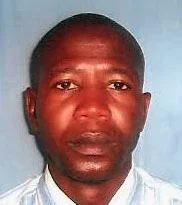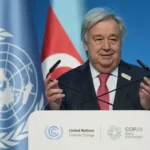Afolabi Gambari
Contents
Nothing could be more auspicious for Nigeria than the fact that the 2025 UNICEF World Children’s Day was marked on November 20. It was even more auspicious for the fact that 25 students had been abducted in the early hours of November 17 from Government Girls Comprehensive Secondary School, Maga in Danko/Wasagu Local Government Area of Kebbi State. Still, nothing could be much more auspicious for the Minister of Budget and National Planning, Senator Abubakar Atiku Bagudu, who gave the opening speech at the United Nations House Auditorium, Abuja, where an event to commemorate Children’s Day was held.Bagudu stood in front of over 30 students drawn from about six primary and secondary schools in the Federal Capital, carrying a heavy burden of explaining what happened at Kebbi a few days before. It was like a father having to lift up the spirit of his grieving children; a heavy task. He started by offering a prayer for the abducted girls and stressing the government’s efforts to ensure their safe return home. He also assured the government’s determination to give the Nigerian children a new lease of life that would guarantee a good future. “Government is doing everything humanly possible to see that the abducted children regain their freedom soonest,” Bagudu said, as he also pledged the government’s effort at adequately addressing the menace of out-of-school children that has since reached an alarming proportion, with over 10 million children in primary and secondary schools affected.Mr Mohammed Fall, Resident Humanitarian Coordinator for the United Nations, revealed that two out of every three Nigerian children live in multidimensional poverty, being deprived of more than money as they also lack healthcare, education, nutrition and protection. He said 2.2 million children remain unvaccinated, and 40 per cent of children under five are stunted due to chronic malnutrition, while about 25 per cent of children aged 5 to 17 are engaged in child labour, and one in three girls is married before her 18th birthday. He added that one in four children in rural areas lacks access to safe drinking water, and 30 per cent of households still practice open defecation.UNICEF Nigeria Representative, Ms Wafaa Saeed, in her speech, said the non-profit organisation has contributed to innovative social protection programmes, community-based nutrition drives and media campaigns that continue to shift public attitudes on child rights.She, however, said there is reason to hope for the better in no distant future as Nigeria has achieved over the last few years social protection programmes like the National Social Investment Programme which provides direct support to vulnerable families, more children returning to school as the ongoing digital learning initiatives are helping to bridge the education gap, while community health workers and youth volunteers are now on the frontlines of vaccination, nutrition and hygiene promotion.Ms Saeed conceded that although the statistics are sobering, they also reveal that progress is possible with coordinated effort. “Behind every percentage lies a child whose potential is being stolen by poverty or neglect. But we are also seeing change, millions of children are getting vaccinated, millions are back in school, and more families are accessing clean water and social protection. These are victories worth celebrating,” she said.She stressed the need for government, development partners, donors, the private sector and communities to form a communion that puts the agenda of the Nigerian child on the front burner.The resident representative called for a stronger unity of purpose, saying: “The children are not just our responsibility, they are our future. With nearly half of Nigeria’s population under 18, the choices we make today will define the future of this country, and that is why every investment in children is an investment in peace, productivity, and progress.”Selected students who presented speeches dwelt on topics that include child protection, nutrition, social justice, education, safety and security in schools, sanitation, equality and social protection. As much as they highlighted the challenges being encountered, they also proffered solutions that are far-reaching, among which are: creating a national and state-level Child Protection Fund to support essential services; expanding multidisciplinary protection teams and establishing a unified case-management information system; strengthening legal frameworks, expanding safe-school initiatives, and implementing national campaigns against harmful practices, increasing funding and ensuring that benefits reach the poorest households, especially rural and vulnerable communities; raising national investment in education, healthcare and child-welfare beyond the current 16 per cent, expanding community nutrition programs by increasing community-based management of malnutrition centers and scaling up ready to use therapeutic food and micronutrient distribution; strengthening maternal and child health systems by integrating nutrition into primary healthcare and training more health workers; improving school-based nutrition initiatives by expanding school feeding programmes and using digital platforms for real-time nutrition data; ensuring adequate and sustainable support for essential services; guaranteeing representation of marginalised children in youth councils, school leadership, media, and community programmes; implementing healing-focused approaches that build empathy and reduce punitive discipline, especially for children who face early disadvantages, such as the 75 per cent of under-fives without birth certificates who are multidimensionally poor; and developing gender-responsive and rural-focused policies to address entrenched disparities and break cycles of deprivation.They also posited that their teachers should be given regular training, mentoring and financial support, in addition to helping them to come up with a well-developed curriculum that will emphasise critical thinking, creativity and problem solving.But, above all, they were unanimous in the following declaration: “Listen to our voices.” Can society afford not to listen?
Nothing could be more auspicious for Nigeria than the fact that the 2025 UNICEF World Children’s Day was marked on November 20. It was even more auspicious for the fact that 25 students had been abducted in the early hours of November 17 from Government Girls Comprehensive Secondary School, Maga in Danko/Wasagu Local Government Area of Kebbi State. Still, nothing could be much more auspicious for the Minister of Budget and National Planning, Senator Abubakar Atiku Bagudu, who gave the opening speech at the United Nations House Auditorium, Abuja, where an event to commemorate Children’s Day was held.
Bagudu stood in front of over 30 students drawn from about six primary and secondary schools in the Federal Capital, carrying a heavy burden of explaining what happened at Kebbi a few days before. It was like a father having to lift up the spirit of his grieving children; a heavy task. He started by offering a prayer for the abducted girls and stressing the government’s efforts to ensure their safe return home. He also assured the government’s determination to give the Nigerian children a new lease of life that would guarantee a good future. “Government is doing everything humanly possible to see that the abducted children regain their freedom soonest,” Bagudu said, as he also pledged the government’s effort at adequately addressing the menace of out-of-school children that has since reached an alarming proportion, with over 10 million children in primary and secondary schools affected.
Mr Mohammed Fall, Resident Humanitarian Coordinator for the United Nations, revealed that two out of every three Nigerian children live in multidimensional poverty, being deprived of more than money as they also lack healthcare, education, nutrition and protection. He said 2.2 million children remain unvaccinated, and 40 per cent of children under five are stunted due to chronic malnutrition, while about 25 per cent of children aged 5 to 17 are engaged in child labour, and one in three girls is married before her 18th birthday. He added that one in four children in rural areas lacks access to safe drinking water, and 30 per cent of households still practice open defecation.
UNICEF Nigeria Representative, Ms Wafaa Saeed, in her speech, said the non-profit organisation has contributed to innovative social protection programmes, community-based nutrition drives and media campaigns that continue to shift public attitudes on child rights.
She, however, said there is reason to hope for the better in no distant future as Nigeria has achieved over the last few years social protection programmes like the National Social Investment Programme which provides direct support to vulnerable families, more children returning to school as the ongoing digital learning initiatives are helping to bridge the education gap, while community health workers and youth volunteers are now on the frontlines of vaccination, nutrition and hygiene promotion.
Ms Saeed conceded that although the statistics are sobering, they also reveal that progress is possible with coordinated effort. “Behind every percentage lies a child whose potential is being stolen by poverty or neglect. But we are also seeing change, millions of children are getting vaccinated, millions are back in school, and more families are accessing clean water and social protection. These are victories worth celebrating,” she said.
She stressed the need for government, development partners, donors, the private sector and communities to form a communion that puts the agenda of the Nigerian child on the front burner.
The resident representative called for a stronger unity of purpose, saying: “The children are not just our responsibility, they are our future. With nearly half of Nigeria’s population under 18, the choices we make today will define the future of this country, and that is why every investment in children is an investment in peace, productivity, and progress.”
Selected students who presented speeches dwelt on topics that include child protection, nutrition, social justice, education, safety and security in schools, sanitation, equality and social protection. As much as they highlighted the challenges being encountered, they also proffered solutions that are far-reaching, among which are: creating a national and state-level Child Protection Fund to support essential services; expanding multidisciplinary protection teams and establishing a unified case-management information system; strengthening legal frameworks, expanding safe-school initiatives, and implementing national campaigns against harmful practices, increasing funding and ensuring that benefits reach the poorest households, especially rural and vulnerable communities; raising national investment in education, healthcare and child-welfare beyond the current 16 per cent, expanding community nutrition programs by increasing community-based management of malnutrition centers and scaling up ready to use therapeutic food and micronutrient distribution; strengthening maternal and child health systems by integrating nutrition into primary healthcare and training more health workers; improving school-based nutrition initiatives by expanding school feeding programmes and using digital platforms for real-time nutrition data; ensuring adequate and sustainable support for essential services; guaranteeing representation of marginalised children in youth councils, school leadership, media, and community programmes; implementing healing-focused approaches that build empathy and reduce punitive discipline, especially for children who face early disadvantages, such as the 75 per cent of under-fives without birth certificates who are multidimensionally poor; and developing gender-responsive and rural-focused policies to address entrenched disparities and break cycles of deprivation.
They also posited that their teachers should be given regular training, mentoring and financial support, in addition to helping them to come up with a well-developed curriculum that will emphasise critical thinking, creativity and problem solving.
But, above all, they were unanimous in the following declaration: “Listen to our voices.” Can society afford not to listen?







